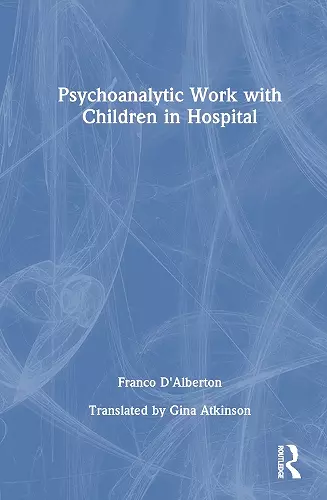Psychoanalytic Work with Children in Hospital
Franco D'Alberton author Gina Atkinson translator
Format:Hardback
Publisher:Taylor & Francis Ltd
Published:30th Dec '22
Currently unavailable, our supplier has not provided us a restock date
This hardback is available in another edition too:
- Paperback£31.99(9781032172026)

Psychoanalytic Work with Children in Hospital presents the experiences of a psychoanalyst working within a hospital paediatric department.
It explores the possibilities for applying psychoanalytic theory when working with children in hospital and how it can be extended to include parents, caregivers, health care staff and volunteers. Each chapter of the book addresses an issue or area of professional experience that presented Franco D’Alberton with clinical or technical questions, outlining the core concern and then exploring his attempt to provide answers to these questions. This volume presents many possible applications of psychoanalytic theory in a paediatric hospital, encompassing issues encountered by health care staff and volunteers as well as by parents and their hospitalized children, such as physical pain, meetings and information sharing and group settings. It also describes therapeutic interventions directed towards both children and parents.
This book will be key reading for child and adolescent psychoanalysts, psychotherapists, and clinical psychologists in practice and in training. It will also interest clinicians seeking to understand how psychoanalytic work can be applied in hospital and health care settings.
'In a period when psychoanalysis is often under attack, this book comes as a real breath of fresh air. Beyond more typical psychoanalytic treatment, psychoanalysis conducted without a couch, in the hospital, continues to be of immense help to children and their families in making sense of their symptoms and in better understanding how development is affected by suffering. We owe a debt of gratitude to Franco D’Alberton for proceeding in the wake of Anna Freud’s pioneering work, against all odds, to accomplish this important clinical psychoanalytic work.'
Bernard Golse, Emeritus Professor of Child Psychiatry (University of Paris), Psychoanalyst (APF) and President of the European Association for Child and Adolescent Psychopathology, France
'It is a pleasure to recommend Dr. Franco D’Alberton’s book to a wide readership of health care professionals including paediatricians, nurses, and psychotherapists. Dr. D’Alberton succeeds in expounding to the reader several major strands in his thinking; one is how the clinician can open up a space for reflection on emotions and the unconscious implications of somatic symptoms in a child. A second strand concerns how somatic illness in a child can affect the entire family. The third is to give clinical accounts of his consultation work at paediatric centres with a methodology that he describes in a vivid and warm way. All in all, his idea of "bringing the psychoanalytic couch to the children’s hospital", that is, introducing a mind-opening perspective to patients and clinicians alike, is equally interesting and important.'
Björn Salomonsson, Child psychoanalyst (IPA), Associate professor child psychiatry, Karolinska Institutet, Stockholm
'"Every Time Freud is Right, a Psychologist Dies". Not elegant, but this T-shirt slogan flags my resistance, expecting environment or endeavour alien to UK paediatrics. After subbing some terms, and my usual cringe at the power imbalance between the unknowing patient and the interpreting psych, came the recognisable complex interplay of psychological and physical presentation, insights, and co-working. Ceasing my internal theory-tug-rope I was, soon writing, "WIZE" and "YES!" in the margins. Likening hospital psychology to basil, ‘good with most soups’, D’Alberton introduces identity, what you have vs what you are, upholds intellectual curiosity, centres societal and family context, and gives us the psycho-dynamics of interprofessional organisational systems. Chapters of well written wisdom are made accessible, organised by theoretical fundamentals and specific clinical concerns, e.g. Neonates, Pain and Memory; Parent-Child Consultations; Functional Disturbances, and chapters on group work with staff. The work is modern, relevant, enjoyable and above all helpful. It is a book that nourishes as it teaches; reminding us that our wide ranging medical and psychological practice is interpersonal and intrapersonal, and mind/body severance is futile. Recommended.'
Dr Julie Alderson,Lead Psychologist for Women and Children’s Division, University Hospitals Bristol and Weston, UK
“Psychoanalytic Work with Children in Hospital addresses an important gap in the pediatric consultation-liaison literature. In the necessarily medicalized environment organized around quests for concrete data and algorithms for diagnoses and treatments, there is often not enough room for emotional work around pain, trauma and healing for the child and their parents. Franco D’Alberton sensitively considers the child's subjectivities and search for meaning despite surrounding complexities, confusions and omissions. He addresses important subjects, “Different Times of Trauma and its Intergenerational Transmission” and “Communicating the Diagnosis,” as well as other topics that span development from neonates through adolescents. He demonstrates his expertise with groups, ranging from individual families in Consultations with Parents and Parent-child Interventions to group therapies with parents, children and adolescents, anxiety management for hospital staff and sessions for hospital volunteers. Most importantly, D’Alberton makes psychoanalytic concepts and teachings accessible to the reader through case vignettes and comprehensible explanations.”
Susan L. Donner, Training and Child, Adolescent and Adult Supervising Analyst, Director of Child and Adolescent Psychoanalytic Training, and Director of the NCP Child and Adolescent Clinic at the New Center for Psychoanalysis, Los Angeles
ISBN: 9781032172019
Dimensions: unknown
Weight: 453g
220 pages